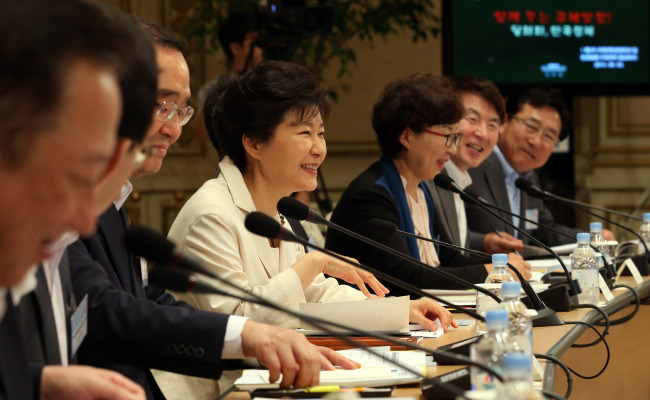President Park Geun-hye on Wednesday urged officials to speed up efforts to eradicate old and unnecessary regulations to resolve inconveniences for the public, lure investment and create high-quality jobs.
During a meeting held at Cheong Wa Dae, the president stressed that Korea does not have much time left to decide how to achieve future growth and that regulatory reforms would help the country achieve economic success. The president also urged officials to use creative thinking rather than simply turning down public demands to remove regulations.
“Countries around the world are in a heated competition for deregulation to attract investment and create jobs,” Park said at a televised meeting on regulatory reform.
“We can’t help but have a sense of crisis over our deregulation efforts, whether we were complacent or tardy about them,” she said.

President park Geun-hye presides over a meeting for deregulation at Cheong Wa Dae on Wednesday. (Yonhap)
The meeting was widely seen as an attempt by Park to push for her deregulation drive amid political deadlock over the special Sewol bill. It was first planned to be held last month but was delayed on Park’s request to resolve problems raised during the first round of the forum held six months ago.
In March, she presided over a seven-hour marathon meeting to gather various opinions and check on conflicting ideas over regulations. Park believes that deregulation is a key part of her three-year economic innovation plan announced early this year. She has been enthusiastically calling for regulatory reform, branding unnecessary regulations “an enemy that must be crushed” and “a tumor that needs to be removed.”
The meeting, planned to be an open discussion on deregulation, was attended by about 170 people including ministers, representatives from major business groups, experts on deregulation, and owners of small and big businesses.
The president said that the nation’s deregulation drive has been put on hold with bills pending at the parliament, and due to a lack of cooperation between related ministries and opposition from the persons concerned.
“The ruling and the opposition party, the government and the National Assembly, or the central government and the municipalities can’t act separately for the regulatory reform (to succeed),” Park said.
“I expect to have everyone cooperate in harmony to resolve inconveniences for the public and to create jobs through regulatory reform,” she added.
In the second part of the meeting, ministers unveiled the government’s plan to remove regulatory obstacles revitalize the online and construction markets and to create future growth for the agriculture industry. The government expects to create new markets or spur investment worth 17.5 trillion won ($17.2 billion) and save 1.5 trillion won in public expenditure through the new deregulation scheme.
Despite Park’s passionate drive to promote deregulation, it remains unclear whether the reform efforts could produce enough substantial improvements in the near future to receive public acknowledgement and support.
Former presidents have also pushed for deregulation schemes. But most ended in failure or resulted in ministries creating more regulations than before.
The Park administration’s regulatory reform scheme is also expected to face a bumpy road due to the continued political stalemate over the Sewol bill.
The rival parties have been locking horns over the main opposition New Politics Alliance for Democracy’s demand for full investigative rights for victims’ families in the independent probe into the ferry accident. The NPAD and the victims’ families have been pushing President Park to act on the issue.
The presidential office has maintained its stance that the Sewol bill issue belongs to parliament and should be handled by the two parties.
By Cho Chung-un (christory@heraldcorp.com)





![[KH Explains] No more 'Michael' at Kakao Games](http://res.heraldm.com/phpwas/restmb_idxmake.php?idx=645&simg=/content/image/2024/04/28/20240428050183_0.jpg&u=20240428180321)
